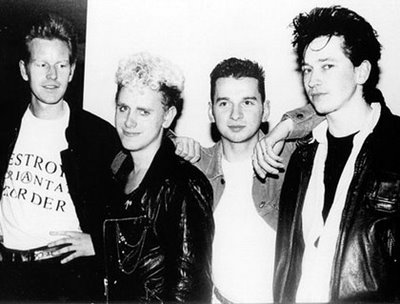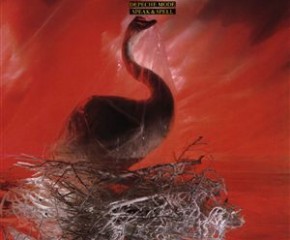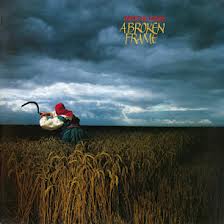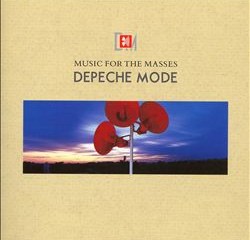
Described as a ‘quintessential electro-pop band’ in the ’80s and one of the most successful bands of the ‘alternative’ ’90s, Depeche Mode entered the first half of the 21st century as a band that had already amassed worldwide fame. By 2000, they already had 10 albums to their name, commercial and critical success, and squillions of dollars. They also carved their niche in a genre that can only count on one hand the number of successful career artists. They are imitated across several genres with artists as diverse as Rammstein, Monster Magnet, Smashing Pumpkins and the Deftones all paying homage or respect as evidenced on the 1998 tribute album For the Masses. One has no farther to look at the careers of The Bravery, Linkin Park, Interpol, Placebo and any number of EDM artists today to see how wide their shadow across the plains of contemporary rock reaches. In part one of their discography, the Popblerd staff reviews the band’s genesis in 1981 with their debut album Speak and Spell through their 1987 album Music for the Masses.
Much like the early records by their brothers-in-angst The Cure, Depeche Mode’s debut sounds like a test-run for the sound that would eventually become a trademark. Speak & Spell, appropriately, is a “starter” DM record. Of course, this is complicated by the fact that Speak is the one and only DM album to feature Vince Clarke in the band. Clarke would famously go on to become one half of pioneering synth-pop duos Yaz and Erasure. Seeing as how Clarke wrote ¾ of Speak & Spell, it’s not surprising that the album sounds more like a Yaz album than it does a Depeche Mode album. David Gahan hasn’t found his voice yet-hell, he even sounds like Allison Moyet on the track “NODISCO,*” but the album’s still pretty enjoyable. It’s significantly more upbeat and peppy than later Depeche Mode albums would be, and it’s bolstered by two perfect new-wave singles, “New Life” and “Dreaming of Me.” There’s also a slightly extended version of the song that put Depeche Mode on the map, the bouncy “Just Can’t Get Enough.”
While the sinister vibe that would be a hallmark of future DM albums is nowhere near as present here, it still seeps through on the track “Puppets,” as well as the oddball instrumental “Big Muff” and the oddball non-instrumental “Tora! Tora! Tora!” No surprise that the latter two songs were written by Martin Gore. While Depeche Mode wouldn’t really sound like “Depeche Mode” for another couple of albums, their debut is by no means unworthy of the occasional listen.
Grade: B (Big Money)
*Yes, I know that the Yaz album came after “Speak & Spell,” but I heard “Upstairs at Eric’s” first, so that’s why I made the comparison in reverse.
A Broken Frame is almost like Depeche Mode’s second debut. As soon as you hear the multi-tracked chorale that opens “Leave in Silence,” you know that this is a different band than the one that recorded Speak & Spell. Vince Clarke is now out of the lineup, and Martin Gore has assumed control of the band. The arrangements have gotten more complex (the synthesizer is no longer on the “basic” setting,) and the lyrics have gotten substantially darker. “My Secret Garden” is really the first Depeche Mode song that sounds like a Depeche Mode song. With all that said, though: A Broken Frame sounds like a step backwards. The band hasn’t grown into their signature sound yet, and there are a few songs that are an ill fit, most notably the cod-reggae of “Satellite.” There are no songs as good as “New Life,” “Just Can’t Get Enough,” or “Dreaming of Me,” and Gore’s lyrics on a few songs (“Photograph of You” most notably) are downright cringe-worthy. They say that sometimes you’ve got to move back to move forward, and A Broken Frame, while showcasing an expansion in sound, is a pretty crappy album altogether. Ladies and gentlemen, welcome to the turd in Depeche Mode’s album catalog.
Grade: C (Big Money)
Construction Time Again (1983)
Construction Time Again is the first Depeche Mode album that features Alan Wilder, and it’s yet another step towards Depeche Mode officially sounding like Depeche Mode. The synthesizers are less bouncy, and more mechanical sounding. The songs are slightly better written, the music is significantly more fuller-sounding, and Dave Gahan sounds a bit more like the Dave we know and love. The instrumentals are gone, and the band’s sound is both more reigned-in and more expansive than it was on the last album (if that makes any sense at all.) Also, someone taught them to make great singles again-“Everything Counts” is a fantastic song, despite the regrettable presence of the synth-harmonica. Somewhat unfortunately, that’s the only great single on the album. Construction Time Again is still very much the sound of a band in progress. With thirty years having passed since this album’s release, it’s obvious to see that Depeche Mode was headed in a particular direction (and they got there just one album later,) but they’re not totally there yet. “Pipeline” is a pretty interesting sound collage, less a song (or at least less one that was meant to be played on the radio) than an atmospheric piece. “And Then…” marries a fantastic melody to some pretty cool sonics (and, hey…is that a guitar?) Gore, still the primary songwriter (although Wilder jumps in with a couple of co-writes) has shifted his focus slightly from the personal to the worldly, although “Shame” will make you wish he’d just kept writing about boy-meets-girl, boy-loses-girl.
Grade: B- (Big Money)
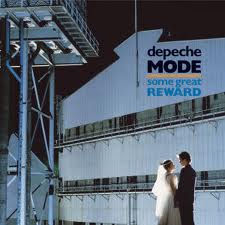 Some Great Reward (1984)
Some Great Reward (1984)
Some Great Reward was the album where Depeche Mode became Depeche Mode. While previous albums might have offered up some classics in the Mode canon, Some Great Reward was at turns cynical, romantic, and downright hopeless, and even the brightest moments offered hints of darkness. “Lie to Me” could be seen as a spiritual predecessor to the much more famous “Policy of Truth”, a lesson in the value of deception, while “It Doesn’t Matter”, read front to back, is one of the most hopeless songs of unrequited love ever put to tape. “Master and Servant” introduced S&M to the Hot 100, while fellow single “Blasphemous Rumors”, which closes the album, might be the most overt indictment of a God too in love with irony that Martin Gore ever wrote.
There were blasts of hope in Some Great Reward, most exemplified by singles “People are People” (the most lasting of the album’s songs) and “Somebody”. The former is a call to put aside our differences, while the latter is a shockingly tender love song from the purposefully fragile voice of Martin Gore. These are what keep the album from being utterly dank and hopeless, small rays of light puncturing the stormclouds. One can’t imagine a better cover for an album like this; newlyweds outside an abandoned warehouse, finding a moment for bliss in a dying landscape. It’s the perfect setup for a Black Celebration.
Grade: B+ (Mike S)
Black Celebration (1986)
This is the album where DM really begin the process of ‘hitting their stride.’ It’s also an album where Gore truly feels comfortable in his beats and lyricism. It manages to spawn singles and live staples left in right. This is the album that features the title track, ‘A Question of Time,’ ‘A Question of Lust,’ ‘Stripped,’ and ‘Fly on a Windscreen.’ Lesser known tracks like the stark ‘Sometimes,’ ‘Here in this House,’ and the Gore-led vocal track ‘World Full of Nothing’ continue to hone in on the emotional and musical palette in broader strokes than on previous releases. The back quarter of the album falls a bit flat, despite the upbeat synths on ‘But Not Tonight,’ which is a true diamond in the rough that never got the credit it deserved.
Grade: B+ (KBOX)
On the band’s sixth album, there is a confidence that is fostered as they offer up the prelude to their landmark album, Violator. Album lead off, ‘Never Let Me Down Again,’ is a tour-de-force of atmosphere. ‘The Things You Said,’ is the perfect foil with the unforgettable line ‘you know my weaknesses/I never tried to hide them.’ The second single, ‘Strangelove,’ was like Duran Duran on anti-depressants. ‘Behind the Wheel,’ is the closest the band get to offering a preview of what’s to come on the following album. ‘I Want You Now,’ is one of the most interesting songs in Depeche Mode’s cannon. Mixing a mostly a capella vocal with sparse organ/keyboard and sounds of breathing, groaning and other unsavory mixtures. It’s unsettling and yet Gore’s paring of some of these unnatural sounds somehow works, especially within the framework of the bands overall sound. It’s a leap, but it’s one that works. This album also spawned ‘To Have and To Hold.’ I need to be cleansed/it’s time to make amends/for all of the fun/the damage is done – time to jump back in the mud. This tune was covered by The Deftones brilliantly – Gore’s lyricism full of bite and darkness and able to stand up to another’s interpretation. “Nothing,’ is both a nod to the bands past and a salute to it’s present. This album is the bridge between the first half of the band’s career and the second half. It’s an essential ‘must have,’ in rock music period and definitely within the electronic genre as a whole.
Grade: A (KBOX)
Stay tuned for Part Two…in which Depeche Mode BLOWS THE HELL UP.

